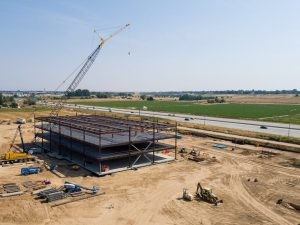By Holly Beech
Meridian Press
The five-story Columbus building in the new Ten Mile Crossing office park in Meridian is scheduled to open next summer, housing Brighton Corporation, Paylocity and others. (Courtesy of David Turnbull)
Local builders are keeping a close watch on material prices in the aftermath of Hurricanes Harvey, Irma and Maria.
“We’re still somewhat waiting to see how much we should assume that there’s going to be some potential cost increases and potential supply issues from that region,” homebuilder Corey Barton, president of CBH Homes said.
“We’re probably trying to anticipate the worst and be happy with the best.”
The hurricanes’ impacts could be twofold: one, the storms disrupted the production of materials, such a petroleum used in PVC pipe; and two, the demand for labor and supplies are expected to increase as the damaged communities rebuild.
Barton said he’s heard from subcontractors that petroleum-based pipe prices could see a 20 percent spike because of Hurricane Harvey. Most of the country’s oil refineries are in the Gulf Coast, according to the Associated Press.
“We’ll be watching pricing closely to decide whether or not to buy or just hold off until it goes down,” Barton said. “We can only hold off so long.”
These pipes are used for water and sewer in subdivisions, he said.
Developer David Turnbull, owner and CEO of Brighton Corporation, said pipe suppliers who normally agree to a price two months in advance are now waiting until the order is placed.
“I don’t think our petroleum-based products come out of Houston, but it does ripple across the entire country,” Turnbull said. “It’s a significant supply disruption.”
Some builders are worried that transformers, which transmit electricity to houses and buildings, will be in short supply because they’ll be needed in hard-hit areas.
Idaho Power, however, is not anticipating a shortage of transformers or other materials as a result of the recent hurricanes, spokeswoman Stephanie McCurdy said.
“We actually accelerated our transformer orders in advance of the hurricanes to ensure we wouldn’t have a shortage,” she said.
REBUILD
As communities hit by the hurricanes rebuild, the market will see an increased demand for materials such as lumber, insulation and sheetrock.
“I don’t know if it’s going to impact us or not. It’s still too early to tell,” said Rick Lierz, CEO of Franklin Building Supply. “I think they’re still cleaning up more than they are rebuilding.”
In general after a hurricane, he said, some product prices increase as demand goes up. In Idaho, that could mean homebuyers will see a slight bump in new home prices.
The rebuild will also require a lot of construction workers and building experts — some of whom might come from Idaho, which is already facing a construction labor shortage.
“We might see some of those folks head south, which will tighten the labor market here even more,” Lierz said. “But that still remains to be seen.”
ALREADY TIGHT MARKET
Even before the hurricanes hit, Idaho’s construction market was facing a number of challenges that were causing price increases and project delays.
One challenge has been the shortage of subcontractors.
Another has been lumber prices, which have been high all summer due to the high demand for wood and the wildfires in the U.S. and Canada, Lierz said.
Builders also say the tariffs the Trump administration put on Canadian softwood lumber this year has led to higher lumber prices.
Any impact the hurricanes have on Idaho will “just add pressure to an already tight situation,” Turnbull with Brighton Corporation said.
“Every supply chain is tight,” he said. “There’s a lot of pressure in the industry right now, a lot of cost pressure, unrelated to the hurricanes. It’s something we’ve already been dealing with. The hurricanes just exacerbate the problem.”





